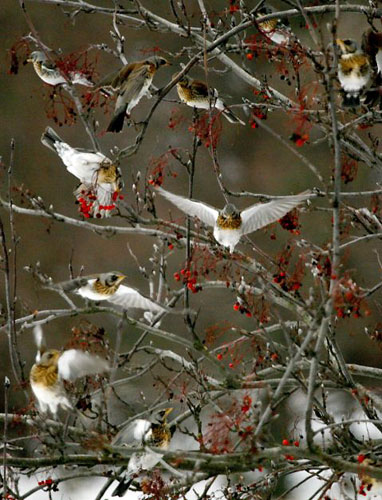TOP STORIES Beached whales die in Australia
Beached whales die in Australia
BBC News - news.bbc.co.uk
30 Nov 2008
Photo credit: Associated Press
Area: Sandy Cape, Tasmania, Australia - Map It 
Many of the long-finned pilot whales, which were discovered on Saturday, had been badly injured by jagged rocks. Rescuers did manage to shepherd about 30 whales trapped in shallow reefs to safety using a small boat, an official said. Whales pass Tasmania as they migrate to and from Antarctic waters and stranding is not uncommon.
Assam bird flu due to migratory birds: Ramadoss
Sindh Today - www.sindhtoday.net
29 Nov 2008
Area: Assam, India
Migratory birds are behind the fresh outbreak of bird flu in Assam, Indian Health Minister Anbumani Ramadoss said Saturday, adding that culling operations had started in the northeastern state and ‘inter-country bird movements are under close scrutiny’. ‘Yes, we are concerned and this new outbreak is mainly due to migratory birds,’ Ramadoss told IANS. ‘We are taking measures to control it, and let me assure that everything is under control. A team from the central health ministry has already gone to Assam and is helping authorities there,’ he added.
 Reported Wildlife Mortality Events to the USGS National Wildlife Health Center Updated
Reported Wildlife Mortality Events to the USGS National Wildlife Health Center UpdatedUSGS National Wildlife Health Center
01 Dec 2008
Area: United States
USGS and a network of partners across the country work on documenting wildlife mortality events in order to provide timely and accurate information on locations, species and causes of death. This information was updated on Nov 28, 2008 on the USGS National Wildlife Health Center web page, New and Ongoing Wildlife Mortality Events Nationwide. Quarterly Mortality Reports are also available from this page. These reports go back to 1995.
New hope of curing amphibian plague
Mongabay.com - news.mongabay.com
28 Nov 2008
J Hance
. . . Some hope for frogs and toads has been found at the Institute of Zoology in London. Scientists have discovered that tadpoles infected with Bd are cured by the fatal disease when submerged in an antifungal drug, itraconazole, for five minutes everyday day for a week. “Even using extremely low doses, we showed that you can eliminate Bd from tadpoles,” Trent Garner told New Scientist. A month after treatment the tadpoles had developed none of the side effects connected to itraconazole, the most worrisome being liver damage.
>>>FULL ARTICLE
Related News
>>>The number of endangered amphibians in Peru may be underestimated
>>>Javanese frog species on brink of extinction, observer says
>>>Researcher Links Agricultural Chemicals to Infections in a Declining Amphibian Species
Related News
>>>The number of endangered amphibians in Peru may be underestimated
>>>Javanese frog species on brink of extinction, observer says
>>>Researcher Links Agricultural Chemicals to Infections in a Declining Amphibian Species
 National HPAI Early Detection Data System (HEDDS) Update
National HPAI Early Detection Data System (HEDDS) UpdateNBII Wildlife Disease Information Node
01 Dec 2008
Area: United States
Highly Pathogenic Avian Influenza Early Detection Data System (HEDDS) is an avian influenza data sharing repository. NBII and a network of partners across the nation have created HEDDS to hold data from different surveillance strategies and to provide a comprehensive view of national sampling efforts.
Recent HEDDS Activity
- Nov 26, 2008: The LPAI H5N1 results table has been updated with information on samples collected on Oct 26, 2008 from a Northern Northern pintail in Saint Clair county, MI.
- Nov 26, 2008: The LPAI H5N1 results table has been updated with information on samples collected on Nov 12, 2008 from a Northern Shoveler in Clark county, WA.
- Nov 25, 2008: 307 samples and tests were added to HEDDS for 2008. Total is now 64,182.
LAST WEEK'S TOP READ LINKS
- Poor safety training blamed for biologist's death
- University of Wisconsin researchers hunting for disease-spreading ticks
- Scientists can't explain cause of amphibian extinction crisis
- Causal inference in disease ecology: investigating ecological drivers of disease emergence [journal article]
- Why Are So Many Infectious Diseases Jumping From Animals To Humans?
- Climate, Environment, and Infectious Diseases: A Report from the AIBS 2008 Annual Meeting [journal article]
- Parvovirus is killing wolf pups in Minnesota
- Penguin, Now Extinct, Discovered in New Zealand
- Scientists discover 21st century plague
- Puget Sound Researchers Find Antibiotic-Resistant Bacteria in Orcas
OTHER WILDLIFE HEALTH RELATED NEWS
Photo credit: Guardian - The Week in Wildlife
 Contagious livestock disease found in Mesa County [Pseudorabies, Colorado]
Contagious livestock disease found in Mesa County [Pseudorabies, Colorado]- Protection boost for rare gorilla [Cross River Gorilla, Cameroon]
- Biologists find new environmental threat in North American lakes [Decreased calcium levels, US and Canada]
- Elephant seal likely died of blunt-force trauma: Marine biologist [Nanaimo, British Columbia] - Map It

- Scientist speaks of ‘depression’ due to climate change [Emotional depression]

- Which virus will birds give us next? [Human metapneumovirus]
- Wild Deer and Bovine TB [United Kingdom]
- Wash. biologist hazes swans away from deadly lead [Lead, Washington]
- Kids, moms warned against deer meat [Lead, North Dakota and Minnesota]
- Bacterial disease killing striped bass [Mycobacteriosis]
- Sea Level Rise Alters Chesapeake Bay’s Salinity [Increased salinity]
WILDLIFE HEALTH RELATED PUBLICATIONS
Phylogenetic analysis of West Nile virus isolated in Italy in 2008
Eurosurveillance. 2008 Nov 27; 13(48): Article 2. [free full-text available]
G Savini et al.





No comments:
Post a Comment